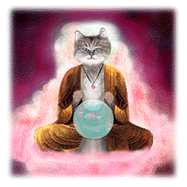So why is dhamma interesting to me?


art of it was my different childhood. It was
the Reagan era, and I grew up in a conservative New England town, but I was raised by a '70s-style hippie
mother. Sometimes I'm disappointed about missing all the good gurus and
spiritual hedonism of the '60s, but I got my share growing up. When my cat
was hit by a car, my mom told reincarnation stories; our next cat was named
Rama after a Hindu god. I received a TM (Transcendental Meditation) mantra
at age eight and had been blessed by several gurus by the time I was 12. My
house was filled with incense smoke, and there were sacred meditation
paintings, altars, and a crystal ball. My brother and I ate a lot of tofu.


s a teenager I wanted to be as normal as
possible, of course, so I hid my upbringing from my friends--and from myself. It wasn't until my India trip
that I encountered dhamma in a form I was ready to hear. I was living in
Dharamsala, India, working ferociously for human rights in Tibet, when I
encountered the teachings on a Buddhist retreat.
Some sort of shift occurred in my mind upon
hearing what Buddhists call the "second noble truth"--that the cause of
suffering is
attachment.


es, of course, I realized: I am attached. I saw how much
of my self-esteem and the personality I had created were based on receiving praise. I saw how
deeply I craved physical and mental pleasure and how much of my life was
centered around getting it. It was revolutionary to imagine that I could be
free from unhappiness if I lost this attachment.

hasing after more and more pleasurable
experiences was never going to satisfy me. There was always more to want. And when I thought back to the
most amazingly pleasurable experiences I had had, I wondered where was that
pleasure now?










